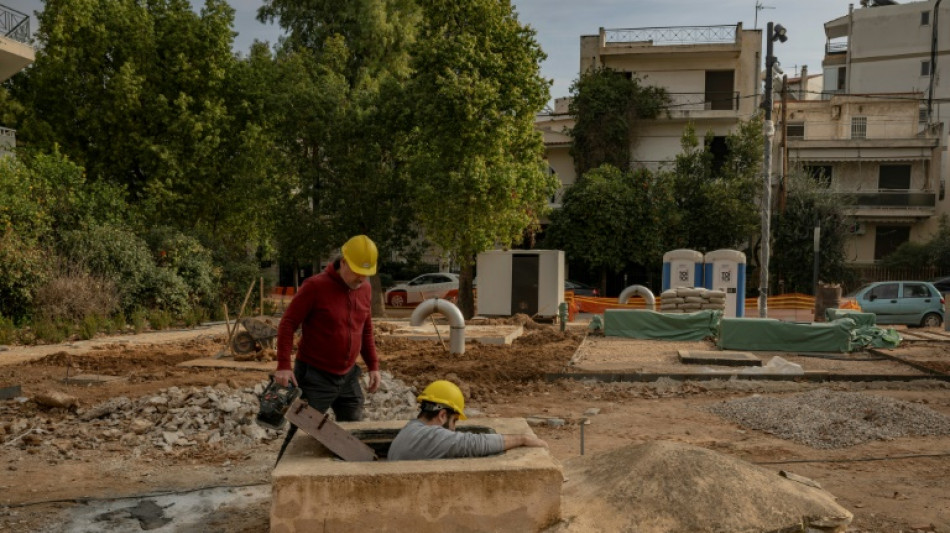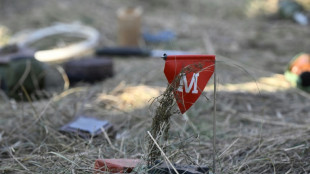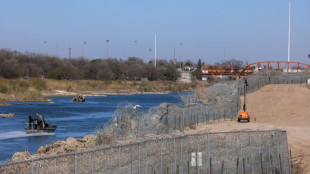
-
 US senator smashes record with 25-hour anti-Trump speech
US senator smashes record with 25-hour anti-Trump speech
-
Brazil binman finds newborn baby on garbage route

-
 US senator smashes record with marathon anti-Trump speech
US senator smashes record with marathon anti-Trump speech
-
Trump advisor Waltz faces new pressure over Gmail usage

-
 Niger junta frees ministers of overthrown government
Niger junta frees ministers of overthrown government
-
Trump set to unleash 'Liberation Day' tariffs

-
 Boeing chief to acknowledge 'serious missteps' at US Senate hearing
Boeing chief to acknowledge 'serious missteps' at US Senate hearing
-
Real Madrid hold Real Sociedad in eight-goal thriller to reach Copa del Rey final

-
 Nuno salutes 'special' Elanga after stunning strike fires Forest
Nuno salutes 'special' Elanga after stunning strike fires Forest
-
PSG survive scare against Dunkerque to reach French Cup final

-
 Sundowns edge Esperance as crowd violence mars quarter-final
Sundowns edge Esperance as crowd violence mars quarter-final
-
Nottingham Forest beat Man Utd, Saka scores on Arsenal return

-
 Elanga wonder-goal sinks Man Utd as Forest eye Champions League berth
Elanga wonder-goal sinks Man Utd as Forest eye Champions League berth
-
Stock markets mostly advance ahead of Trump tariffs deadline

-
 US movie theaters urge 45-day 'baseline' before films hit streaming
US movie theaters urge 45-day 'baseline' before films hit streaming
-
Saka scores on return as Arsenal beat Fulham

-
 Third-division Bielefeld shock holders Leverkusen in German Cup
Third-division Bielefeld shock holders Leverkusen in German Cup
-
Ball-blasting 'Torpedo bats' making waves across MLB opening weekend

-
 Newsmax shares surge more than 2,000% in days after IPO
Newsmax shares surge more than 2,000% in days after IPO
-
Thousands of Hungarians protest against Pride ban law

-
 GM leads first quarter US auto sales as tariffs loom
GM leads first quarter US auto sales as tariffs loom
-
Tesla sales tumble in Europe in the first quarter

-
 No 'eye for an eye' approach to US tariffs: Mexico
No 'eye for an eye' approach to US tariffs: Mexico
-
NFL club owners back dynamic kickoffs, delay tush push vote

-
 Trump 'perfecting' new tariffs as nervous world braces
Trump 'perfecting' new tariffs as nervous world braces
-
Trump nominee says to press UK on Israel arms

-
 French court says Le Pen appeal ruling could come before presidential vote
French court says Le Pen appeal ruling could come before presidential vote
-
The battle to control assets behind Bosnia crisis

-
 Prabhsimran powers Punjab to IPL win over Lucknow
Prabhsimran powers Punjab to IPL win over Lucknow
-
Mass layoffs targeting 10,000 jobs hit US health agencies

-
 Tiger's April Foolishness: plan to play Masters just a joke
Tiger's April Foolishness: plan to play Masters just a joke
-
Myanmar quake toll passes 2,700, nation halts to honour victims

-
 Turkish fans, artists urge Muse to cancel Istanbul gig
Turkish fans, artists urge Muse to cancel Istanbul gig
-
US seeks death penalty for accused killer of insurance CEO

-
 UK govt moves to block sentencing guidelines for minority defendants
UK govt moves to block sentencing guidelines for minority defendants
-
Trump puts world on edge as 'Liberation Day' tariffs loom

-
 Swedish journalist jailed in Turkey kept 'isolated': employer
Swedish journalist jailed in Turkey kept 'isolated': employer
-
Stock markets advance ahead of Trump tariffs deadline

-
 Gulf between Everton and Liverpool has never been bigger, says Moyes
Gulf between Everton and Liverpool has never been bigger, says Moyes
-
Finland to withdraw from anti-personnel mine ban treaty

-
 UK vows £20 million to boost drone and 'flying taxi' services
UK vows £20 million to boost drone and 'flying taxi' services
-
Ford's US auto sales dip in first quarter as tariffs loom

-
 Digging for box office gold, 'A Minecraft Movie' hits cinemas
Digging for box office gold, 'A Minecraft Movie' hits cinemas
-
Southampton boss Juric desperate to avoid Premier League 'worst team' tag

-
 Thailand rescue dogs double as emotional support
Thailand rescue dogs double as emotional support
-
Five takeaways from Marine Le Pen verdict

-
 Stock markets split ahead of Trump tariffs deadline
Stock markets split ahead of Trump tariffs deadline
-
Turkish fans, artists urge Muse to cancel Istanbul gig over protest dispute

-
 Former captain Edwards named new England women's cricket coach
Former captain Edwards named new England women's cricket coach
-
Haaland ruled out for up to seven weeks: Man City boss Guardiola


Arid Athens turns to ancient aqueduct as climate crisis bites
Between parked cars in a suburban street in Athens, workers fix a pump to an ancient stone well that in turn accesses an aqueduct built almost 2,000 years ago.
The Greek capital, one of Europe's hottest and most densely populated cities, is going to great lengths -- and depths -- to battle soaring summer temperatures and creaking infrastructure.
Officials are tapping European Union money to help restore access to Hadrian's Aqueduct, a 24-kilometre (15-mile) underground channel named after the Roman emperor who funded its construction in the year 140.
It is hailed by experts as an "engineering marvel".
Last year, public utility company Eydap repeatedly warned Athenians they needed to save drinking water as reserves shrank.
Eydap's Katerina Apostolopoulou, who manages the project in the Chalandri suburb, around 10 kilometres from central Athens, said the water would not be of drinking quality and instead would be used "to clean or to irrigate parks and gardens" in summer.
She pointed out that Athenians would normally need to use the drinking water network for their gardens and parks, so she hoped the new pump would help save the valuable resource.
- War shelter -
The aqueduct, which begins at the foot of Mount Parnitha, is fed by an aquifer, explained geologist Yannis Dafnos.
A gentle slope from the mountain helps the water flow down naturally into the city centre.
The Chalandri well is more than 20 metres deep and part of a network of 300 ancient wells, Dafnos said as he lifted the heavy iron cover.
George Sachinis, Eydap's director of strategy and innovation, called the aqueduct an "archaeological and engineering marvel".
He urged planners to use it to create more green spaces in a city hit hard by the climate crisis.
"It is one of the most important ancient aqueducts in Europe," he said.
The aqueduct helped supply the city for hundreds of years but fell into disuse after the Roman era.
Athenians began to reuse it at the end of the 19th century but it was abandoned again after two dams were constructed near the city.
During the Nazi occupation (1941-1944) and then the ensuing Greek civil war, one of the Chalandri wells that it is now dry was used as a shelter, said Christos Giovanopoulos, who heads Cultural Hidrant, a heritage management project at Chalandri town hall.
The restoration project is part of "the promotion of sustainable development in Athens", he said, adding that water was often wasted.
- 'Collaborates with nature' -
He said the Chalandri project aimed to promote green spaces and improve the microclimate through water recycling, while highlighting the archaeological and cultural importance of the entire monument.
A few years ago, Chalandri residents had to zigzag to avoid the well, which at the time was located in the middle of the street, Giovanopoulos said.
Now, the northern Athens suburb will be the first of eight municipalities in the Athens region to benefit from the reuse of the aqueduct's water.
An adjacent dry well has been fitted with a ladder to allow visitors to descend and view parts of the ancient conduit.
The aqueduct eventually reaches the centre of Athens at the foot of Lycabettus Hill, once the site of a Roman reservoir.
Only a few parts of the original reservoir construction remain. The existing structure with stone columns and arches is largely a reconstruction from the nineteenth century.
At the very bottom, in the ancient canal, "a few parts of the roof built by the Romans to prevent rocks from falling into the aqueduct remain", Sachinis said.
"It is an elegant piece of infrastructure that respects and collaborates perfectly with nature," he said.
"Thanks to this aqueduct, there are plans to create more green space around the original reservoir", he added.
Y.Aukaiv--AMWN



